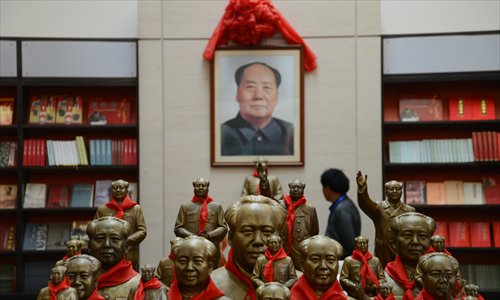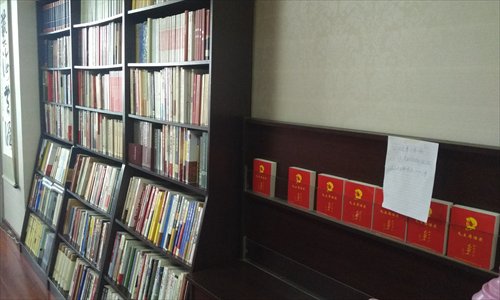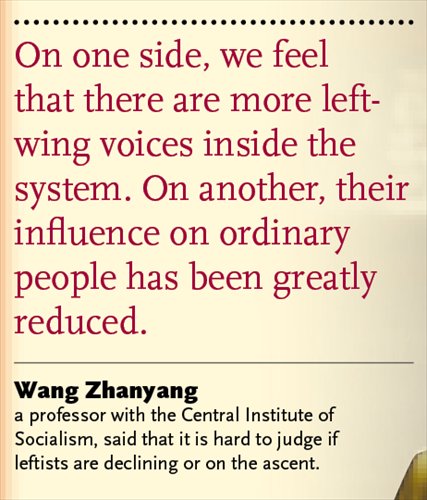Maoist websites hang on despite shrinking public influence
Utopia, a leading Maoist website, has struggled hard to regain its previous popularity since it was temporarily shut down in 2012 following the fall of Bo Xilai, a senior Party official. Some scholars argue that Maoism will remain marginal as long as the majority of people support economic reform and the market economy.

A visitor browses through souvenirs at a store in Chairman Mao’s hometown of Shaoshan, Hunan Province. Photo: CFP
Crammed in a small rented apartment outside Beijing's North Fifth Ring Road, the office of China's most prominent leftist website is quiet.
Visitors to Utopia, a Maoist website that has its office in a 50-square-meter one-bedroom flat, are few. There is a shelf filled with copies of the "Little Red Book" of Quotations from Chairman Mao, a computer in the corner and a single sofa bed.
A man surnamed Wang, 59, is the only worker there. He said that he works and lives in the office and mostly spends his days answering phone calls and occasionally receiving visitors from home and abroad.
Utopia has had to move the office several times in the past three years.
While the Mao Zedong Thought that Utopia promotes is still China's official guiding philosophy according to the nation's constitution, the website is struggling financially and many commentators have argued that the country's left-wing forces are in decline.
But in recent years more and more leftist websites have been founded. There are at least 40 major Maoist websites that promote Marxism-Leninism, defend Chairman Mao and attack what they perceive the country's moves toward capitalism and liberalism.
Wang Zhanyang, a professor with the Central Institute of Socialism, said that it is hard to judge if leftists are declining or on the ascent.
"On one side, we feel that there are more left-wing voices inside the system. On another, their influence on ordinary people has been greatly reduced. Some former leftists are now reformists and liberals," Wang told the Global Times.
"Mainstream public opinion supports reform and the market economy, rather than asking for another round of cultural revolution and planned economy."
Up and down
Utopia moved to the Changping suburban district last year from an office building near the city center, saving 6,000 yuan ($915) in rent monthly. But Wang denied that financial reasons were behind this move. "The rent is much lower, but it's next to a subway station and the traffic is much more convenient," he said.
During the three hours the Global Times reporter was visiting Utopia, the phone never rang and no other visitors came by, except a delivery man who came to fetch a package of 500 badges of Chairman Mao.
Wang said that things were different in 2008, Utopia's glory days. At that time, the website was based in a three-star hotel that stands in one corner of prestigious Peking University.
Back then, aside from the website, they had a bookstore and a hall which regularly hosted hundreds of people for lectures and film screenings. When the Wenchuan earthquake occurred in 2008, they immediately organized and sent a rescue team to Wenchuan, Southwest China's Sichuan Province, which won them great applause.
Now, its bookstore has shut down and its lecture hall belongs to someone else.
"It moved out of the 'university district.' The move was mainly due to financial difficulty but it is also a symbol that Utopia is leaving center stage," commented Guo Songmin, an ardent Maoist.
Utopia was founded by leftist scholars in 2003 as a response to social problems such as wealth disparity, corruption, pollution, gambling and prostitution and as a counterbalance to what Utopia founders saw as liberal control over mainstream public opinion, Guo said.
Since then, several of its founders have left, with some going on to found other leftist websites.
Utopia quickly became an influential platform for pan-leftists to fight against liberalism. But after 2008, it became more and more like a political clique, commented Guo.
When Bo Xilai, then Party chief of Chongqing Municipality, launched red-song campaigns, organized a harsh crackdown on crime and sent college students to the countryside for field trips, Utopia's opinion leaders and followers praised Bo's revival of Maoist practices.
It even sent representatives to extend regards to the city's police officers and sent them silk banners, traditional symbols of appreciation.
Utopia's fortunes began to change in April 2012 when their website wyzxsx.com was shut down in the wake of Bo's high-profile dismissal for serious discipline violations. Although the website later reopened, they have moved their content to wyzxwk.com

Book shelves at the Beijing office of Utopia. Photo: Huang Jingjing/GT
Rise of other red-themed websites
Wang is proud and outspoken about his time with Utopia, his memories of the Mao era and his feelings about the Chairman. He makes no bones about his love of Mao Zedong.
But Wang became shy when asked about Utopia's other staff, offices and the number of hits the website receives, asking the Global Times reporter to instead ask website manager Fan Jinggang. Fan also decided to keep these details to himself, but let on that censorship of the website's content has been getting stricter over time.
Although Utopia is allegedly losing fans, others are seemingly garnering more and more followers. Searching on QQ messenger, there are at least 10 groups named after the Honggehui (meaning red song association) leftist website, with some having hundreds of members.
Several websites, including Honggehui, declined the Global Times' interview requests. These websites all defend Mao and call for a revival of Mao's revolutionary spirit. But most of them are secretive and do not make public their address or personnel.
Zhang Hongliang, a leading Maoist ideologue and professor at Minzu University of China, says that Maoists have had to go underground. "The leftists are demonized. The liberals are always favored by media, but we are always suppressed," Zhang told the Global Times. He cited that his posts on Weibo or WeChat are always blocked and his books are rejected by publishers even when they aren't about politics.
Zhang Changlin, a retired Party official in Xi'an, Shaanxi Province, who launched leftist sddhzg.com on June 1, 2013 said his website was founded to fight liberal control of the media.
He said the website, which publishes articles written by over 700 regular freelancers, has regularly been ordered by the Internet authorities to delete pieces. Sometimes the whole website is blocked, and it has been repeatedly attacked by hackers.
The website has been inaccessible since May 10. Zhang said he assumes that this latest blockage is linked to a report they ran about a symposium held in Xi'an on May 8 to reflect on the Cultural Revolution (1966-76) that was attended by about 80 people. The symposium ended in dispute, as people fought over whether the government's policies during that era were correct or not, Zhang said.
But the symposium was criticized for having "celebrated" the disastrous period and calling for a new cultural revolution.
Sima Nan, a conservative-leaning scholar said most leftist websites are poor, unlike their rightist counterparts. "We can easily see the gap between the sites from where they hold their activities, to their kinds of dishes they eat at their meetings," Sima told the Global Times.
In 2011, a symposium to commemorate a resolution adopted in 1981 by the Communist Party of China which rejects the values of the Cultural Revolution was held at Sofitel, a five-star hotel in Beijing. The organizers of the event including hybsl.cn and Southern Weekly are widely regarded as being liberal.
Most leftist websites are sponsored by businessmen or live on donations, according to insiders. Zhang Changlin says he had to spend about 2,000 yuan, nearly two thirds of his monthly pension, to maintain his website.
To stay afloat, some have started to expand their business. Besides sales of Maoist knickknacks and magazine sales, Utopia has started to accept advertisements on its website and magazine. The latest ads it published promote a class which offers to teach parents how to keep their kids healthy with Traditional Chinese Medicine.
It has also established a travel company to organize tours to places of historical significance to communism.
Zhang Hongliang, who has had more than 1,000 articles published on leftist websites, said he has never received payments, and he even had to pay for his own dinner while giving lectures.

Worries and hopes
Sima Nan suggests that leftists are treated unfairly by the authorities and given less freedom of speech than liberals.
However, Wang Zhanyang feels that the government is right to keep a close eye on leftists.
"If the authorities keeps blocking remarks which denounce the Cultural Revolution but let those radical leftist remarks that praise the period get stronger, the chaos would possibly be repeated," he noted.
He argued that a concert that seemed to praise the Cultural Revolution which was recently held at the Great Hall of the People should not have been put on.
"But when I and several other friends recently gathered in a private site in Beijing to watch a documentary about the period filmed by the foreign media, the police officers showed up after 20 minutes and disbanded us," Wang complained.
Guo said the major problem for these red-themed websites is that they haven't got a shared theory nor an influential figure. "They are like loose sand. They have failed to seriously draw lessons from the past errors and have yet to draw up a complete theory and blueprint for a new socialism," Guo told the Global Times.
But he believed that these websites have played a great role in social enlightenment and diversity of discourse. "They are also an important force against foreign plots of color revolution," Guo noted.
Some Utopia contributors have called for a new strategy. An article written by "Explorer" published on May 16 called for all leftists to unite, not to discuss how bad private ownership is or to denounce "traitors" but to promote Mao Zedong Thought at the grass-roots level, to mobilize workers to fight for their interests and to persuade farmers to collectivize.
But Wang believes that they would never become mainstream, saying many of their followers have changed their notions after seeing things with their own eyes.
Xin Yunxing, lecturer of College of Political Law and Political Science, Zhejiang Normal University, is one of them. In the two years after 2004 he was infatuated with the viewpoints preached by Utopia and their scholars, according to an article he published on news portal aisixiang.com in June 2013, recalling his shift from a leftist to a liberal.
In that period he lost interest in his work but was full of anger about social injustice. In 2007 he began reflect and gradually decided that it made little sense to attribute all China's problems to "the rise of capitalism" and the "conspiracy of the American imperialists."
"I would never accept reeducation by the 'non-governmental Party school'," he wrote. "I hope my story can help more young people to walk out of the 'Utopia' which might cause endless disasters to humankind."
Newspaper headline: Red alert